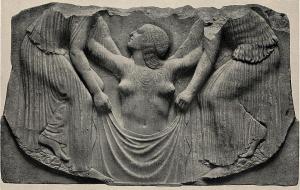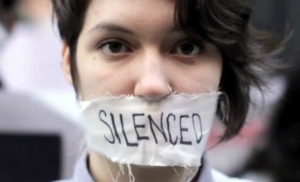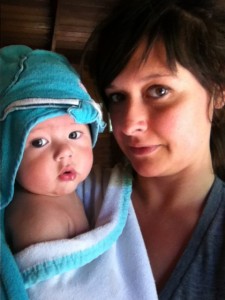1 in 7 mothers in the US today report experiencing postpartum depression or anxiety. Among lower socio-economic groups, the numbers jump to 1 in 4 women. It takes many forms. It may not look what a woman or her family thinks depression or anxiety look like. You cannot always tell a mom has postpartum depression just by looking at her. She may think it’s just her, that there is something intrinsically wrong with her. She may need medication or counseling or both or neither. She may get the help she needs or she may suffer alone. She may very well believe that it is because of something she did or didn’t do. And she may think of a million things that if only could change, she would feel like herself again.
But often the truth is that if you are that mom, yourself is a foreign concept. You might not know where to find her if you even had the chance to go looking between feedings and diaper changes. That is because she is gone.
Forever gone.
There is a new you emerging but you haven’t met her yet. And then there is this strange, precious tiny bundle of constant need snuggled in your arms. You, but not you. Your body yet not your body, an extension of your heart and yet also alien.
1 in 7 is what the stats are. But we know it is probably much higher. (Read: “How Many Women Really Get PPD?”)
It was me too.
The month of May is Maternal Mental Health Awareness month. In the last few decades the US has made great strides in recognizing the millions of Americans living with chronic and often debilitating mental health conditions and reducing the stigma around seeking treatment. While we still have a ways to go in creating accessible and affordable programs for all who need them, the ongoing conversation in mainstream media has begun to shift in a positive direction. And recently a few celebrity moms have spoken out recently about their own struggle with postpartum depression (PPD). But maternal mental health still seems to carry a particular charge.
“How much crying is normal?” I asked the doctor over the sound of my son’s screams, while I bounced and patted and rocked and walked and sweated, bleary-eyed and my throat raw with the pain of swallowing my own scream. “Some babies just cry a lot,” she said gently, reassuringly.
But secretly, I was kind of wondering about me.
Because the truth was, we spent whole days crying, he and I. Here I had this beautiful, perfect little boy who in all respects was deemed healthy but who howled like his insides were twisted, with an intensity meant to drown all other sound, all other need or thought except the sheer urgency of alleviating suffering. But there was no soothing. Colic, they said.
“The most important thing is that you get yourself some support,” the doctor went on. You don’t understand, lady. The only thing I need is for my baby to stop crying. Then everything will be fine, I thought.
Depression and I have a history. But had I even allowed myself to think about seeking help, I was well acquainted with what the out of pocket expenses were for therapy and medication. My medical coverage had dropped me at 6 weeks postpartum and my family was barely getting by. In the past few years I had worked hard and developed a strong set of tools to help me navigate and see myself through the low times. However, blindsided by traumatic a delivery and the unprecedented level of demand on the physical, mental and emotional levels, my tools were simply too far out of reach. Deep down I really believed that it was just me. What was wrong with me that I felt like I couldn’t do what women had been doing for millions of years, what seemed to come naturally to every mother around me?
A year and half or so after that day in the Dr.’s office, I had a conversation with a mom friend about her postpartum experience. She says she wished there were some kind of hotel or care center that new moms could check themselves into for a few days and compassionate staff would care for the baby, offer moms a hot shower, uninterrupted sleep and nutritious meals until she re-cooped her strength to feel like she could keep going. Kind of like triage for moms and babies. A place where you a mother could go and say “I need help” without fear of being judged.
Newborn needs, post pregnancy hormones, physical trauma, lack of adequate rest and nutrition and then add major identity shift, relationship stress, pressure to go back to work, financial strain, plus whatever-specific-challenge-you-got and it’s a straight up malatov cocktail. That’s not to mention the the pressure to get back “in shape”, lose the pregnancy weight, reconnect with your partner, etc. It is a wonder that the stats aren’t much higher.
Our culture is among the least supportive of their needs and yet there seems no other demographic we judge more harshly than mothers. Right now, thousands of mothers feel alone and scared to speak up out of intense fear that to confess the need for help equals admitting incompetence. The heartbreaking reality is that thousands of women will believe the lie that they are actually are failing at motherhood when the truth is we were never meant to do it all alone. We were meant to be having babies and raising children in a community, surrounded by our village, our people, our fellow women.
Birth was meant to be treated as sacred initiation, a rite of passage, marking a major life transition in a woman’s life. Historically, the very vulnerable time following birth held much more significance in the past than it does today. Customs vary across cultures but often for a period of 30-40 days mothers were were attended to on physical, emotional and spiritual levels with ritual, special food preparations and healing herbs. Women were allowed to process and heal and step into her new role as mother in a space that revered birth as the powerful and transformational event that it is.
I have talked to so many women with such different stories about labor, delivery and recovery, it is high time that we expanded our notion of what a “normal” postpartum period looks like to include every woman’s experience.
I wonder now if I had given myself permission to have my own authentic experience without all the judgment and shame, how that first year would have been different. Because what my depression what telling me was the truth. I was very fortunate to become a mother to a beautiful little boy. But what is also true was that he screamed almost continuously for 5 months. There was no sleeping through the night until he was over two years old. The simple act of feeding my child was heart wrenching, complicated and tremendously stressful. The truth was there were days I was in so much pain I sobbed just leaning over the bassinet to lift him. The truth is I went back to work too soon and worked two jobs nearly full time while caring for my infant at the same time which is only possible if you give up eating and sleeping, basically. I was completely numb. And yet when people asked me how I was doing I said, “We’re good!” and forced a smile while on the inside I wondered how I was going to survive the next 24 hours. But somehow I still didn’t feel like there was room for my real experience within the socially misconstrued idea of what motherhood should feel like. (When someone asks, “how do you like being a mother?” they aren’t really looking to hear that you feel like you are in a nightmare you can’t wake up from.)
The truth was that I felt let down and betrayed by the reality of giving birth, left alone to flail and grapple with deep fear, inadequacy, loneliness and pain, robbed of the experience of becoming a mom that I had dreamed of my whole life and silenced by a prevailing myth that I should be this happy, glowing, grateful image of a new mom. I was angry but there was no one to be angry with. So I swallowed it and smiled. I was deep in grief but grieving is not something typically associated with the first year of motherhood, aka: the happiest time of your life.
I didn’t want the label of PPD, I wanted someone to validate that what I was experiencing was legitimately difficult. That under these circumstances any normal person would have a hard time feeling blissed out. I wanted someone to say that it wasn’t just hormones, it wasn’t just sleep deprivation, it wasn’t just the colic.
I wanted permission to feel like this was the hardest thing I had ever endured and that I didn’t have to do any more than to endure it.
There are many factors that go into maternal mental health. I am not suggesting that all we need to “cure” maternal mental illness is a community of herb-wielding wise women and extended paid parental leave. But as a culture we could begin by recognizing birth and motherhood for what they are. Not just a marker point on the timeline of a life, but the most momentous and vulnerable time in the life of any woman who chooses to mother a child and a pivotal and irreplaceable period of bonding with a new baby.
Most of us would find the practice of forcing a woman to labor and deliver in silence barbaric and utterly cruel. Would we then silence her call for help after the fact? Would be tell her she should be stronger, that she should be able to handle it on her own, that this is what motherhood is, to swallow to her own screams, her tears and her truth while she nurses that baby through another long, lonely night? Would we relegate her again to quiet indentured servitude to an outmoded and incendiary archetype?
Would we perpetuate the myth that to be a woman is to suffer in silence?
…
PLEASE SHARE THIS POST. If you are a mom, if you know a mom, if this post meant something to you or even if it didn’t – please share it for someone to whom it may matter.
If you are currently suffering with depression or anxiety please know that you are not alone. Speak out. Let someone know. If you know someone who may be struggling, talk to them and let them know you are worried and you care. If you have a story about your own struggle and recovery from postpartum depression or anxiety, speak up. TELL YOUR TRUTH. It is so important.
Toll free hotline: 1-800-PPD-MOMS
Other resources:
Read this: Frequently Asked Questions about Postpartum Depression
Visit here: PostpartumProgress.com
Read this: American Individualism is Destroying our Families
Get involved: National Maternal Mental Health Coalition
More moms being raw and honest:
Read writer Beth Morey’s post: In Which I Stop Silencing Myself and Tell You the Truth





Ai. So, so true. How we literally lose our old selves when we be one mothers and have to create a whole new self, which takes time, people! The baby that screams for 5 months and doesn’t sleep through for years and years – yes, I had that too. It was awful. The pressure that created on our family and me was horrendous. The craving for community, especially with my first, although it pushed me out into the world to create that community, which helped enormously with my second. And respite care for new mums! I love that idea, for sure. Congratulations on getting through it, mama.
LikeLike
Sara, it was my experience and from hearing similar stories from other moms (who may not have had PPD but felt the isolation of new motherhood) that led me and a fellow mama to launch a support group for moms in our rural area of west sonoma county which has begun to evolve into its own little village, which was our vision. Every few weeks a new mom shows up saying “this is what I have needed!” It is beautiful to be able to offer a place where women who are in throes of early motherhood can gather and validate one another. From that hunger for community you describe, the drive to find your “tribe” is built a beautiful web of women holding women … and we just keep folding one another in as they come along.
LikeLiked by 1 person
Annabele, that is beautiful. Can we hear about this space on your blog?
LikeLiked by 1 person
You’re right, its due a post. Coming soon! xo
LikeLike